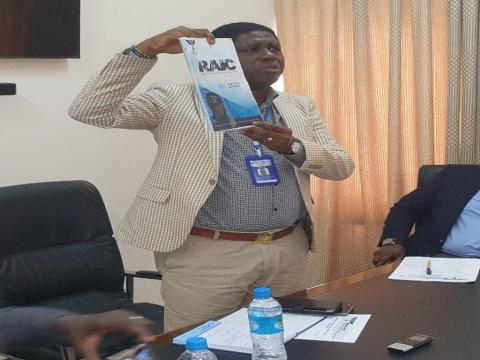By Politico staff writer
The Right to Access Information Commission (RAIC) on Tuesday 3rd August 2022, launched its 2020 Annual Report. The report is the second of its kind launched since its establishment in October, 2014.
Speaking at the launch of the Report in Freetown, the Chairman and Information Commissioner of RAIC, Dr Ibrahim Seaga Shaw said the Annual Report is a statutory obligation enshrined in section 41 of the Right to Access Information Act of 2013 which mandates the Commission to produce an Annual report on its activities, financial status and compliance rate of all public Authorities on Proactive Disclosure of Information (PDI) and the Annual Compliance Report (ACR). The Chairman and Information Commissioner noted that the report is compartmentalised into four parts: Institutional and infrastructural Developments, Projects and Programmes, Compliance and Enforcement, National and International Partnership followed by Financial Statement, challenges, and priorities of the Commission covering the year under review.
He highlighted that during the year under review, the RAIC with support from World Bank and the Open Society Initiative for West Africa strengthened the institution through internal controls, capacity building for staff, Ministries Departments and Agencies (MDAs), Public Information Officers, and professional interest groups such as the Sierra Leone Association of Journalist (SLAJ) and the Sierra Leone Teachers’ Union (SLTU), including training for investigative journalists in October 2020. He further recounted that there were a spike in the Freedom of Information (FOI) requests, especially from journalists, which he said can be attributed to the above activities the Commission undertook in 2020.
He noted that despite the successes, including the RAI regulations that were laid in parliament on Thursday last week, the challenges of limited resources to effectively administer its mandate at the national level had its toll on the potency of the Commission. The harmonization of some laws, especially the civil service secrecy code to which civil servants subscribe, in tandem with the RAI Act was also said to have posed a challenge for the Commission. The Chairman assured all that the doors of the commission are always open to the public.
Chairman of the Independent Media Commission (IMC) Dr. Victor Massaquoi said his institution and the RAIC have two things in common; information. At a time when the country approaches elections, the significance of the partnership between the two institutions cannot be overemphasized, which is why he said the IMC is working to develop elections guidelines and training for journalists to ensure they are treated fairly and the public, on the other hand, is not exploited.
Representing the Ministry of Information and Communications, Records Officer Alhaji Mohamed Jaward thanked the RAIC for opening the space for a transparent and accountable country, which is why they have assigned PIOs and Records officers to Ministries Department and Agencies to enhance openness and good governance. He pledged the ministry’s continued support to the RAIC.
Western Area Commissioner, RAIC paid tribute to SLAJ and Civil Society Organisations for their work in the past years that led to the establishment of the RAIC noting that the beneficiaries of the RAI law are not only Journalists rather for all and sundry.
Secretary General of SLAJ, Alhaji Manika Kamara said they as journalists are key beneficiaries of the RAI Act; he welcomed the news that the regulations are now finally in parliament. SLAJ, he concluded, will ensure they support RAIC in all its endeavours.
The interactive briefing ended with questions and comments from the press and other participants.
Copyright © 2022 Politico Online (05/08/22)








